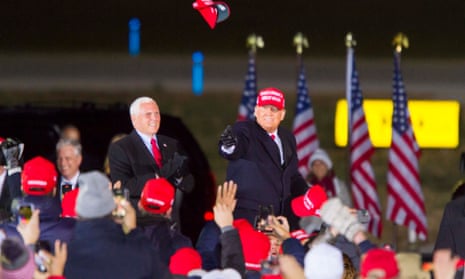There are plenty of stories about how Donald Trump’s mind works. Here’s mine. In 1990, the president of a well-known French retailer asked my father to help him open a branch in Manhattan. So my father contacted Trump, and named the retailer. Trump replied, “Great, I love their neckties.”
Acting as translator, my father took the retailer to Trump Tower, gave Trump the man’s business card with his shop’s name on it and explained to Trump that he wanted to lease space in the tower. Trump was delighted. He met the Frenchman’s lawyers, looked over the lease and signed it. Then, my father got a phone call. “What is this junk you’ve put in my building?” Trump raged, using a less newspaper-friendly word than “junk”. Confused, my father said it was the French store, as they’d arranged. “Where’s Hermès?” he shouted. Trump had met the president, seen his business card and signed the contracts. But because he wanted the luxury brand Hermès in his building, he believed he was getting it.
Narcissists see what they want to see. What makes Trump more unusual is that an astonishing number of people see what they want to see when they look at him. Let us take a brief journey back to the early days of what I guess we can describe as Trump’s emergence on to the political scene, like the Stay Puft Marshmallow Man emerged on to New York City in Ghostbusters. How eager some people were then to reassure us that all was fine, because they wanted it to be. “It would be a mistake to think that [Trump] is all instinct and impulse. He wants to bring to governing the same calculating business style that he has brought to communicating,” Michael Gove somehow managed to write in the Times, while simultaneously giving Trump a proctology examination with his tongue. “The Donald I know,” another British commentator wrote at the time, “is a smart, streetwise, charming (yes seriously!) guy who runs his businesses by putting good people into top jobs and letting them get on with it.” All those “my friend, Donald” takes: how sweetly they have aged. Like cottage cheese left for four years next to an orange boiler.
It’s strangely apt that such a raging narcissist should function as a distorted mirror to so many, one in which they see their own fantasies reflected back at them. Whether he actually is a billionaire or not has never been important: since the 1980s he has presented himself as the cartoon image of one – Daddy Warbucks crossed with a particularly rubbish Bond villain – and people see what they want to see. His white working-class supporters saw in him their own aggrievement at not being accepted by elites who rigged the game; the elites saw a fellow plutocrat who would protect their fortunes. Before this election I often heard people talk anxiously about how, even if Trump lost, “Trumpism” wouldn’t go away.
But what even is Trumpism? The man has never had any moral code beyond closing the deal, and these days barely seems capable of maintaining a thought to the end of a sentence: the idea that he has the desire let alone the wherewithal to construct an ideology is like assuming that monkey on the typewriter is writing Hamlet. Read any thinkpiece and “Trumpism” is boiled down to nativism, showmanship and lying, all of which can be more accurately summed up as “being a racist grifter”. In Authoritarian Nightmare: Trump and his Followers, John W Dean and Bob Altemeyer rightly say that Trumpism is not about Trump at all, but about his followers and their own psychological predispositions. They look at him and see what they want to see: themselves.
The final election result may not be known for days, and yet even before the sun had risen on Wednesday the takes were coming. Joe Biden was too centrist and the Democrats should have embraced a more far-left candidate, was one popular theory advanced by people who a) had apparently never heard of Florida, where some Cuban and Venezuelan-Americans reportedly rejected Biden because of what they perceived as his “socialism” and b) believed Bernie Sanders had been blocked from the nomination by Nancy Pelosi and the Democratic National Committee as opposed to actual Democrat voters, twice, and therefore is possibly not the great unifying candidate some wish.
“Today it is clearer than ever that moving to the political centre is not a winning strategy,” crowed a Momentum press release, with the kind of confidence you might not expect from a group whose far-left UK candidate was trounced in elections, about a US candidate winning by a decisive margin in the popular vote. The left – in the US but also the UK – has always been wilfully resistant to the possibility that a lot of Americans just really, really like Trump, and their vote has nothing to do with the Democrats (or even the Republicans) at all. But as with Trump himself, people look at this election and see what they want to see.
The US-based journalist Andrew Sullivan, who has frequently expressed scepticism about identity politics, declared on Wednesday, “I found the left’s relentless identity politics increasingly repellent. I wasn’t alone.” Others have argued that Biden didn’t use identity politics enough. And yet, given the sheer number of votes Biden got, and that more African-Americans, Latinos and Asians voted for Trump this year than in 2016, and his LGBT vote doubled, the picture is clearly too complicated to bend into anyone’s pet theory. Meanwhile, his Jewish vote shrank, disabusing those who theorised that his pro-Israel policies would woo the Jews, except in Florida where it may have played a part. Isn’t it annoying when people are inconsistent?
Captain Hindsights always insist that whatever just happened in an election was both totally foreseeable and proves their theory. But this election is not proving any theory, other than that the US electoral system is, yet again, not fit for purpose, when a candidate can win millions more votes and still not necessarily win. Biden got the numbers, but not necessarily in the expected demographics, and Trump didn’t win, but he didn’t lose in the way many predicted either. Anyone who sums all this up in one grand principle is attempting to wrench a lot of very disparate groups with wildly differing concerns into a self-serving whole. Trump is a true narcissist, but as his popularity and now his possible final downfall have shown, he is not the only one.

